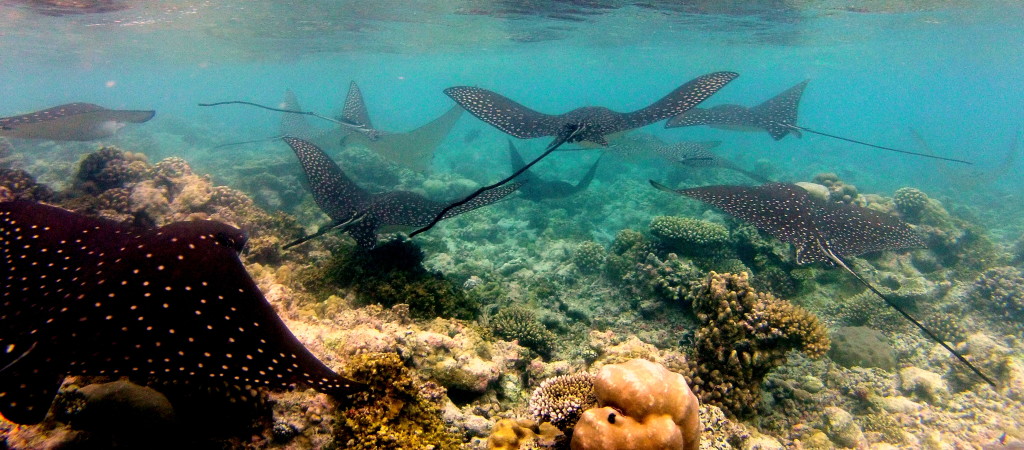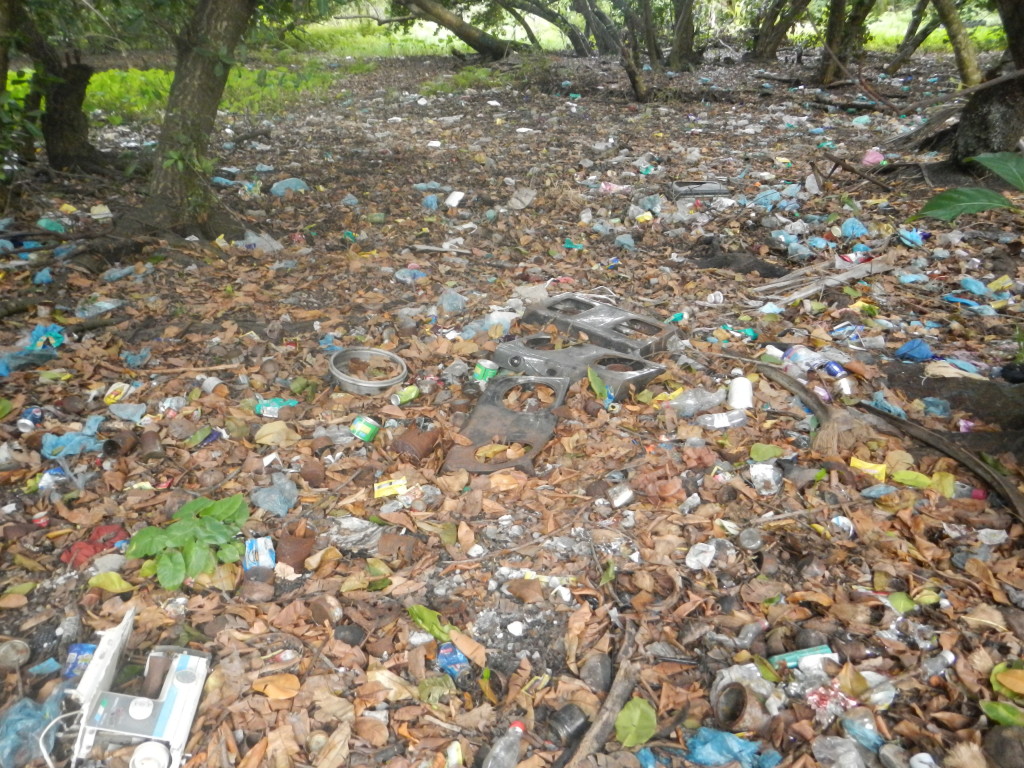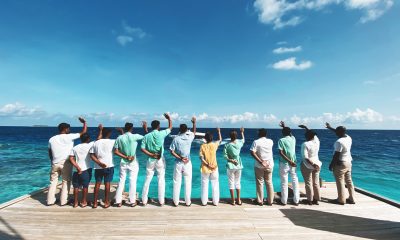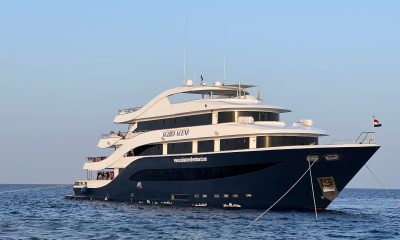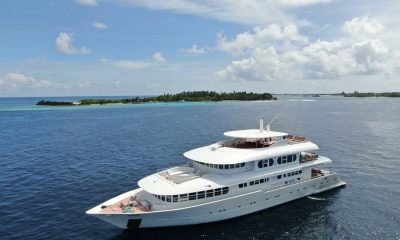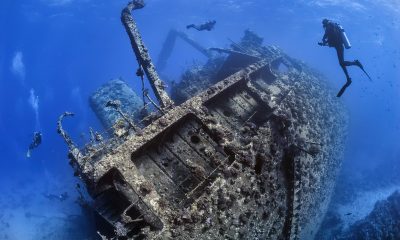Marine Life & Conservation
Marine conservation in the Indian Ocean
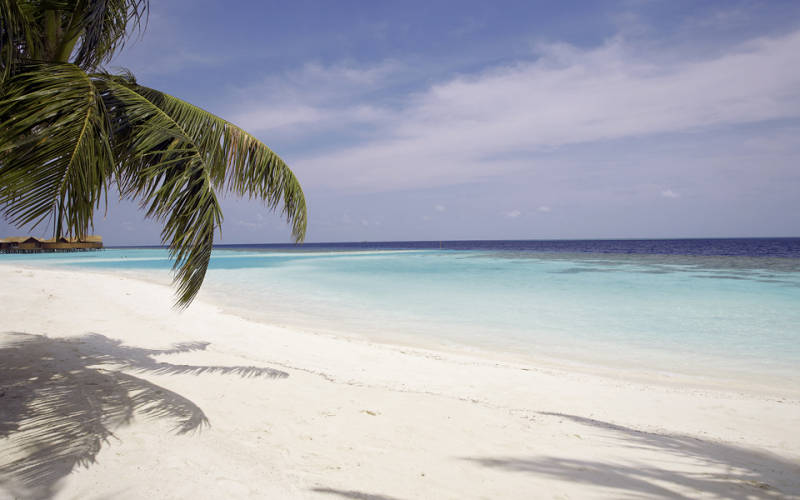
Introduced by Jeff Goodman
Each year more people look for exotic destinations to take their holidays and dive trips and so the human impact on these pristine places takes a terrible toll. Reef destruction, over fishing, uncontrolled development, pollution from human waste… the list is almost endless. So who is ultimately responsible? Local government? Tour operators? Resort companies? Tourists? We all tend to pass the buck while at the same time making as much profit as possible before the golden goose eventually gets choked to death. In the Maldives at least, these issues are starting to be being taken seriously.
The Maldives, called “the flower of the Indies” by Marco polo, is suffering today from new developments and an increased population, including tourism, which together with climate change will synergistically impact on the marine environment.
The Maldives constitutes together with the Laccadives the largest and most extensive chain of atolls on the planet with less than 4% of the territory being dry land, so by joining the two most important forces that drive the country together, conservation and tourism, a long term sustainability of the marine environment can be obtained.
This country is the most imminently threatened by rising seas caused by climate change, so the Maldives has to be prepared for climate change as past emissions will increase global temperatures by up to 0.60º C over the next four decades, so not only must our awareness of climate change increase, so must our need to understand the changes it will bring and our vulnerability to it. Other activities practiced in the Maldives such as coral mining, pollution and unregulated fishing are already impacting on the marine environment, so understanding the effects of temperature increase and ocean acidification is of extreme importance.
A country that is no longer relying on their tuna fishery for survival but depend on resort islands and incoming tourists for their livelihoods have to take care of their environment.
Speaking about the tourism in Male, Kuoni’s Head of Corporate Responsibility Matthias Leisinger once said that “tourism is like fire; you can cook with it, but it can also burn your house down.” The tourism industry generates about 30% of the country´s GDP. In 1998 a bleaching event caused almost 100 percent of mortality in some areas of the coral reefs and, compared to other countries where management was working really well, their recovery was much better than in the Maldives. “Incidents like this are likely to increase as stock diminishes everywhere” says another representative from the Ministry of Tourism in the Maldives. He also pointed out new challenges arising with the changing market profile of tourism in the country, since the European visitors do form part of taking care of the natural environment. However, “the market is changing, and the new market is constituted of guests that are walking on the reefs, catching and eating crabs….” “Maybe it is about time for the resorts “to take responsibility for the natural environment for the duration for the lease,” a representative from the Marine Research Centre (MRC) said. Adjustment is essential if the different sectors, including tourism, aim to reduce the vulnerability to climate change and limit its negative sides and so optimizing the resources to the local community to cope with these changes.
The two biggest threats to the Maldives are climate change and waste management.
Climate change and coral reefs resilience
● Coral Reefs in the Maldives
– The Maldives is home to around 60 different coral genera and has the highest coral diversity in the Indian Ocean. Perhaps due to its substratum or erupted lava, the Maldivian reefs appear to be qualitatively different from other shallow reefs in the Indian Ocean in the way that they are composed of branching Acropora in high abundance and diversity. The Maldives also have the highest temperatures of the Indian Ocean.
– The threats the coral reefs are facing in the Maldives are sedimentation and sewage stress from the bigger islands (from the harbors and airport). In addition to this, inappropriate fishing methodologies are increasing and impact the recovery rate of the reef from bleaching events, and together with the global climate change is the biggest threat nowadays. The impact and the long-term possible recovery of reefs are directly related to overall health of coral reefs.
– For local and national managers to be able to act in response to these threats it is therefore of extreme importance to have monitoring protocols.
Monitoring Protocols
A number of protocols have been developed by the Marine Research Center, the Darwin Initiative, and the Great Barrier Marine Park Authority to monitor reef fisheries and coral bleaching in which corals expel the algal cells (zooxanthellae), that under normal conditions live within their tissue. The Maldives has already experienced extensive climate related damage to their reefs, where other reefs recovered better under similar circumstances, therefore an accurate management and understanding of Coral Reef health has to be implemented around the whole country.
Bleach Watch
This protocol has been developed to detect and measure conditions and events of coral bleaching from a wide range of users like dive operators and resort staff, who over time can prepare available, reliable reports. Detecting early signs of mass bleaching events require a wide network of observers over a broad span of territory.
CPC
Counting the coral coverage and the coral diversity across the Maldives over time will provide the national government and resort managers with valuable information which can be used to understand and act in response to observed changes and threats to coral reef around the Maldives.
Reef Fisheries and the Darwin Reef Fish Project
It is important for the Maldives to obtain more knowledge about reef and fisheries in order to develop new management plans to maintain the Coral Reef’s health. The reef fish are important through herb ivory and predation and both overfishing and destructive fishing practices can alter the dynamics of the whole ecosystem. The Darwin Reef Fish Initiative together with the MRC have developed a new resources management plan, where spawning aggregations and fish home range can be detected to elaborate new management plans. The aquarium and bait fishery have guidelines, but there are no regulations for reef fish, apart from the protected Napoleon wrasse and parrotfish species. The reef fishery has to be managed properly to be sustainable and size limitations of reef fish are necessary, so by implementing this monitoring protocol, miss-reporting and under-reporting fish, like the Rainbow runner, is being sampled and measured to apply appropriate managing guidelines and so improve the resilience of the Coral Reefs.
Fish watch
A fish count and underwater visual census; it constitutes a tool to measure fish populations over time and location.
Fish Catch
A survey collecting information on number and weight of landed reef fish. Together with the measured size and the location of fishing, this gives information for developing marine protected areas. Data is also collected from night fishing practiced by guests of the resorts.
Shark Watch
A diver or snorkel-based recording of shark sightings at the dive or snorkel site on a daily basis. Since the sharks were almost depleted from its water or overfished due to their fins, the tourists are now demanding to see sharks, so since 2009 they have introduced shark protection.
Under the climate change trust fund with World Bank funding a new project is being implemented that will train and empower local community to monitor their coral reefs until September 2014.
A monitoring protocol is developing and a database is going to take shape for the entire country. With less than one per cent of the world’s oceans protected from exploitation and an estimation of that up to 80% of the world´s marine protected areas are only so called and not actively managed, it´s of urgent need to create properly managed and protected areas for the marine environment. All benefits of having marine protected areas are well known, such as conservation of the biodiversity and improvements of the local economy; however, it is so important for the future of the country, which is why a stakeholder approach is needed to monitor these areas and, if necessary, protect and preserve them.
Another issue to consider is how close they need to be, in order to promote connectivity between areas, and how many there should be, to provide a real protection for species. To enhance the resilience of the coral reef in the Maldives not only a reduction on pollution is needed, but also protection and managing existing marine areas properly, can work as an insurance for sustainability.
● Developing waste management systems on inhabited islands
– The Maldives is facing one very big human impact and that is waste management. In the shadow of Thilafushi Island, which is the waste island close to Male the capital, the local islands are struggling with waste processing and associated water quality problems. The Maldivian islands are scattered over a very large area, so distance combined with an increase in population and consumption make the waste management issue very important to resolve.
– A pioneer project involving four northern atolls cooperating to manage the waste at just one island is set up to start working in 2014. This will join resort islands and local islands together, and act as a pioneer project to relieve the burden of Thilafushi.
– By promoting this and taking care of waste closer to the islands where it originated, it is probable that less waste will be dumped in the ocean or buried in the sand or burned producing toxic gases.
– So by doing this, not only will the local islands’ reefs get more resilient by alleviating the human impact, but also the resort island will have less waste washed up on their beaches. This is a good example of both locals and tourists benefitting and eventually the entire economy and the environment.
– Money from separate sources will also be implemented in several projects to teach segregation of waste at household level, and bins will be provided to store the waste separately until removal from the island.
– Probably due to the fact that the islands have accumulated waste over time, a big clean up has to be organized to accomplish the objective of waste management.
The Maldives aims for a total protection of their waters and would like to proclaim the entire country a UNESCO biosphere reserve by 2017 and the country as a Marine Reserve by 2020. Let´s see how this amazingly beautiful country threatened by climate change and waste will manage with such big expectations.
Blogs
The Ocean Cleanup Breaks 10,000,000 KG Barrier

The Ocean Cleanup, the global non-profit project, has removed a verified all-time total of ten million kilograms (22 million lbs.) of trash from oceans and rivers around the world – approximately the same weight as the Eiffel Tower.
To complete its mission of ridding the oceans of plastic, The Ocean Cleanup uses a dual strategy: cleaning up the Great Pacific Garbage Patch (GPGP) to remove the plastic already afloat in the oceans, while stopping the flow of plastic from the world’s most polluting rivers.
Through cleaning operations in the GPGP and in rivers in eight countries, the cumulative total of trash removed has now surpassed ten million kilograms. This milestone demonstrates the acceleration of The Ocean Cleanup’s impact, while underlining the astonishing scale of the plastic pollution problem and the need for continued support and action.
While encouraging for the mission, this milestone is only a staging point: millions more tons of plastic still pollute our oceans and The Ocean Cleanup intends to continue learning, improving and innovating to solve this global catastrophe.
This announcement comes as governments from around the world meet to continue negotiations to develop a new legally binding instrument to end plastic pollution at INC4 in Ottawa, Canada. Representatives of The Ocean Cleanup will be in attendance and the organization will be urging decision-makers to collaborate towards a comprehensive and ambitious global treaty which addresses plastic at all stages of its life cycle and in all marine environments worldwide, including in areas beyond national jurisdiction.
It is encouraging to see that the need for remediation is reflected in the various options for potential treaty provisions. It is essential that the final treaty contains clear targets for the remediation of legacy plastic pollution, and reduction of riverine plastic emissions.
Tackling plastic pollution requires innovative and impactful solutions. The treaty should therefore incentivize the innovation ecosystem by fostering innovations that make maximal use of data, technology and scientific knowledge – such as those designed and deployed by The Ocean Cleanup.
‘After many tough years of trial and error, it’s amazing to see our work is starting to pay off – and I am proud of the team who has brought us to this point.’ said Boyan Slat, Founder and CEO of The Ocean Cleanup. ‘While we still have a long way to go, our recent successes fill us with renewed confidence that the oceans can be cleaned.’
The Ocean Cleanup was founded in 2013 and captured its first plastic in 2019, with the first confirmed catch in the GPGP coming soon after the deployment of Interceptor 001 in Jakarta, Indonesia. After surpassing one million kilograms of trash removed in early 2022, the non-profit project has since progressed to the third iteration of its GPGP cleaning solution, known as System 03, and a network of Interceptors currently covering rivers in eight countries, with more deployments set for 2024.
About The Ocean Cleanup
The Ocean Cleanup is an international non-profit organization that develops and scales technologies to rid the world’s oceans of plastic. They aim to achieve this goal through a dual strategy: stemming the inflow via rivers and cleaning up the legacy plastic that has already accumulated in the ocean. For the latter, The Ocean Cleanup develops large-scale systems to efficiently concentrate the plastic for periodic removal. This plastic is tracked and traced through DNV’s chain of custody model to certify claims of origin when recycling it into new products. To curb the tide via rivers, The Ocean Cleanup has developed Interceptor™ solutions to halt and extract riverine plastic before it reaches the ocean. Founded in 2013 by Boyan Slat, The Ocean Cleanup now employs a broadly multi-disciplined team of approximately 140. The foundation is headquartered in Rotterdam, the Netherlands.
For more information, visit: theoceancleanup.com and follow @theoceancleanup on social media.
Marine Life & Conservation
Steve Backshall to headline Shark Trust’s flagship event: For the Love of Sharks

Join a host of amazing, shark loving, speakers including Steve Backshall and the Shark Trust team for an evening celebrating shark conservation at the Royal Geographical Society in London this November.
Date: 29th November 2024
Time: 6-10pm
Location: Royal Geographical Society, London
Tickets: https://www.sharktrust.org/Event/flos24
The event will be a celebration of all things shark. Those lucky enough to get hold of tickets will hear from engaging guest speakers with a passion for sharks.
The line-up includes (*subject to change if unforeseen circumstances arise)
Steve Backshall: One of television’s busiest presenters, BAFTA award-winning wildlife expert Steve has been passionate about the wild world ever since he was young.
Steve’s impressive TV career has taken him all around the world, investigating a wide array of species and environments. Steve has filmed over 100 hours of children’s wildlife programmes with the BAFTA award winning Deadly 60 franchise and recently, with Sky Nature, for his new series ‘Whale with Steve Backshall’. He has been a patron for the Shark Trust for 10 years.
Simon Rogerson: is a photojournalist specialising in natural history, diving and the sea.
He is editor of SCUBA magazine, the official journal of the British Sub-Aqua Club. Simon started his career as a crime reporter but gravitated towards his ‘less depressing’ interest in underwater exploration, joining the staff of DIVE magazine in 1999. In 2005 he was named ‘Editor of the Year’ in the PPA’s Independent Publishing Awards. Simon also works as a freelance writer, contributing frequently to the Sunday Times and Telegraph, in addition to BBC Wildlife, Esquire, and a host of international diving magazines. He is the author of a book, Dive Red Sea, published by Ultimate Sports. Now based in Berkshire, Simon has been a Patron of the Shark Trust for 20 years.
More speakers to be announced soon. Head to the Shark Trust website to learn more.
The evening will also allow guests the final chance to see the Oceanic 31, shark art exhibition. Some of the artwork will be auctioned/raffled at the event, while the rest will be auctioned online to raise money for the Shark Trust Oceanic Programme.
For the Love of Sharks is an evening with something for everyone who is interested and fascinated by sharks. Join the Shark Trust, their Patrons, Trustees and Staff, along with a host of supporters for this celebration of shark conservation.
For more information or to buy a ticket: https://www.sharktrust.org/Event/flos24
-

 News3 months ago
News3 months agoCapturing Critters in Lembeh Underwater Photography Workshop 2024: Event Roundup
-

 Marine Life & Conservation Blogs3 months ago
Marine Life & Conservation Blogs3 months agoCreature Feature: Swell Sharks
-

 Blogs2 months ago
Blogs2 months agoMurex Resorts: Passport to Paradise!
-

 Blogs2 months ago
Blogs2 months agoDiver Discovering Whale Skeletons Beneath Ice Judged World’s Best Underwater Photograph
-

 Gear Reviews3 weeks ago
Gear Reviews3 weeks agoGEAR REVIEW – Revolutionising Diving Comfort: The Sharkskin T2 Chillproof Suit
-

 Gear Reviews3 months ago
Gear Reviews3 months agoGear Review: Oceanic+ Dive Housing for iPhone
-

 News2 months ago
News2 months agoPADI Teams Up with Wellness Brand Neuro to Drive Ocean Change and Create a Blue State of Mind
-

 Marine Life & Conservation2 months ago
Marine Life & Conservation2 months agoSave the Manatee Club launches brand new webcams at Silver Springs State Park, Florida


